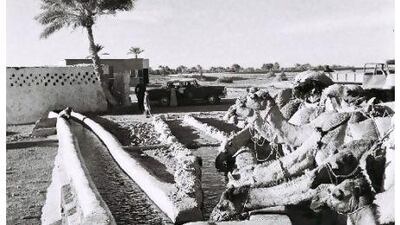Water from the tap had only recently replaced the falaj canals as the main supply in Al Ain when this photograph was taken in the 1970s.
Primarily designed as an irrigation system for date farms, as the image shows, they were also popular with camels and a small boy, who can just be seen in the background enjoying a refreshing drink.
The canals, which also run underground, transport water from the mountains and can be up to 10 kilometres long.
At one time 300 falaj (also known as aflaj) flowed through the city, although many are now dry. Among those still providing farmers with sweet water are Falaj al Dawoudi, Falaj al Jahili, Falaj al Jimi and Falaj al Hili. The latter has an ancient heritage. In 1984, a group of archaeologists found traces of falaj in the Hili area dating back more than 2,000 years. Although falaj have been found in Iran, Iraq, Afghanistan and Algeria, those in Al Ain are believed to be among the oldest in the world.
Time Frame is a series that opens a window into the nation's past. Readers are invited to make contributions to yourpics@thenational.ae


